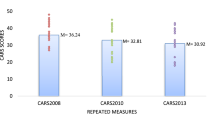Abstract
Short break services in a UK county were studied using a postal survey of 256 families with a child with an autistic spectrum disorder (ASD). Results confirmed high degrees of stress and low levels of informal support for all families, but no significant difference in the informal support available to non-users as compared to users of short break services. Robinson & Stalker's (1990) 10-point dependency scale showed a significant difference in dependence and more difficult behaviors between children of users and non-users. However, a large number of non-users had children with high dependence (scoring > 7 points). Access was denied by the age of the child (under 11) diagnosis (Asperger syndrome), educational placement (mainstream) and lack of social worker referral.
Similar content being viewed by others
References
Abelson, A. G. (1999). Respite care needs of parents of children with developmental disabilities. Focus on Autism and other Developmental Disabilities, 14, 96–109.
Barson, C. (1998). Autism: supporting the family. A report on the short term care needs of children with autism in Wales. London: National Autistic Society.
Boyd, B. A. (2002). Examining the relationship between stress and lack of social support in mothers of children with autism. Focus on Autism and other Developmental Disorders, 17, 208–215.
Brady, P. (1998). Shaping family support: a study of specialist community based support for families of people with autism spectrum disorders. Nottingham: National Autistic Society.
Bristol, M. M., & Schopler, E. (1983). Coping and stress in families of autistic adolescents. In E. Schopler, & G. B. Mesibov (Eds.), Autism in Adolescents and Adults. New York: Plenum.
Chadwick, O., Beecham, J., Piroth, N., Bernard, S., & Taylor, E. (2002). Respite care for children with severe intellectual disability and their families; who needs it? Who receives it? Child and Adolescent Mental Health, 7, 66–72.
Chan, J. B., & Sigafoos, J. (2000). A review of child and family characteristics related to the use of respite care in developmental disability services. Child and Youth Care Forum, 29, 27–37.
Chan, J. B., & Sigafoos, J. (2001). Does respite care reduce parental stress in families with developmentally disabled children. Child and Youth Care Forum, 30, 253–263.
Cohen, S. (1982). Supporting families through respite care. Rehabilitation Literature, 43, 7–11.
Factor, D. C., Perry, A., & Freeman, N. (1990). Stress, social support and respite care use in families with autistic children. Journal of Autism and Developmental Disorders, 20, 139–146.
Gerard, K. (1990). Determining the contribution of residential respite care to the quality of life of children with severe learning difficulties. Child: Care, Health and Development, 16, 177–188.
Gray, D. E. (1994). Coping with autism: stresses and strategies. Sociology of Health and Illness, 16, 275–300.
Malec, M. A. (1993). Essential statistics for social research. Boulder, CO: Westview Press.
Marc, D. L., & MacDonald, L. (1988). Respite care – who uses it? Mental Retardation, 26, 93–96.
McConkey, R., & Adams, L. (2000). Matching short breaks services for children with disabilities to family needs and preferences. Child: Care, Health and Development, 26, 429–443.
Oberheim, D. (1996). The support needs of adults and children with autism and their carers in Kent. Gillingham: Kent Autistic Trust.
Preece, D. R. (2002). Consultation with children with autistic spectrum disorders about their experience of short-term residential care. British Journal of Learning Disabilities, 30, 97–104.
Randall, P., & Parker, J. (1999). Supporting the families of children with autism. Chichester: Wiley.
Robinson, C., & Stalker, K. (1990). Respite care – the consumer’s view. Bristol: Norah Fry Research Centre.
Robinson, C., & Stalker, K. (1991). Respite care – summaries and suggestions. Final report to the Department of Health. Bristol: Norah Fry Research Centre.
Sargent, J. A. (1995). The future of respite care resources for children with autism in North East Essex. Colchester: Essex County Council.
Stalker, K., & Robinson, K. (1991). Out of touch: The non-users of respite care services. Bristol: Norah Fry Research Centre.
Tarleton, B., & Macaulay, F. (2003). Better for the break? Short break services for children and teenagers with autistic spectrum disorders and their families. York: Shared Care Network.
Trenenan, M., Corkery, A., Dowdney, L., & Hammond, J. (1997). Respite-care needs – met and unmet: assessment of needs for children with disability. Developmental Medicine and Child Neurology, 39, 548–553.
Van Bourgondien, M. E., & Elgar, S. (1990). The relationship between existing residential services and the needs of autistic adults. Journal of Autism and Developmental Disorders, 20, 299–308.
Author information
Authors and Affiliations
Corresponding author
Appendix
Appendix







Rights and permissions
About this article
Cite this article
Preece, D., Jordan, R. Short Breaks Services for Children with Autistic Spectrum Disorders: Factors Associated with Service Use and Non-use. J Autism Dev Disord 37, 374–385 (2007). https://doi.org/10.1007/s10803-006-0174-2
Published:
Issue Date:
DOI: https://doi.org/10.1007/s10803-006-0174-2




